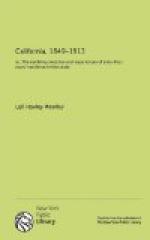A Venture In Oil.
In this year was the beginning of the Civil War and for the benefit of those who came into active life later on I will give them a little of my experience in a small way. At the time I purchased the store of which I have spoken I took over a standing contract they had with a firm in Boston to send them a specified amount of coal oil around Cape Horn, as near six weeks as any vessel would be leaving for San Francisco. I took what was on the way at that time and the shipments were continued to me. At this time it took from sixty to seventy days to get answers to letters from the East. Time and business go on. We had on an average of about two steamers a month from New York with the mails. In 1862 the war tax and stamp act came in force. It was high and quite a hardship for some but everybody paid it cheerfully and with a good grace, and felt that they were getting off easy. About this time greenbacks came into circulation as money. It was legal tender and you could not refuse it. It made a great deal of hard feeling on many occasions but after a long time it set settled down to a premium on gold, which fluctuated from day to day. Finally the premium on gold was so high that currency was only fifty cents on a dollar, that is, one dollar in gold would buy two dollars in currency. On account of this many debtors would buy currency and pay their creditors with it. This was considered very crooked on the part of the debtor. I myself was a victim to some extent. The “Evening Bulletin” exposed a great many men by publishing their names but by so doing it made enemies and it did not last long. All bills rendered from this time on were made payable in United States gold coin. My coal oil cost me fifty cents per gallon in Boston, payable in currency. The freight was also payable in currency. Now my readers will readily see that my coal oil cost me a little over twenty-five cents per gallon laid down in San Francisco. About 1863 there was an unusual demand for coal oil and it was scarce and




